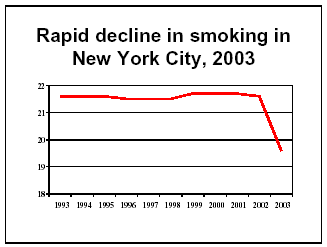It doesn't ad up
The New York Times carried a small story yesterday about pharmaceutical advertising. Seems Congressman Henry Waxman is criticizing the Food & Drug Administration because it isn't going after drug companies enthusiastically enough for their ads:
Mr. Waxman's staff found that the number of notices of violation or warning letters to pharmaceutical companies for misleading ads fell to 24 last year from 108 in 1999.This report is being used by advocacy groups to bash the FDA:When the agency did contact companies about ads it found misleading or incomplete, moreover, it took longer to send its complaints, the report said. For 14 of the ads that generated letters last year, the agency sent letters an average of six months after the ads first appeared. By way of comparison, the report cites a General Accounting Office study of a five-month period in 2002, when the agency took an average of 41 days to send warning letters.
As an example of slow action, the report discussed a consumer ad for Taxotere, a cancer treatment sold by Aventis. The ad first ran in People magazine in October 2002, but the agency did not send a warning letter to Aventis until more than a year later.
"The F.D.A. is in a semi-lawless mode with respect to enforcing drug advertising rules," said Sidney M. Wolfe, director of the Health Research Group at Public Citizen in Washington, an advocacy group. "It began in the Clinton administration, but it's gotten much worse. The amount of enforcement has gone down when the amount of advertising has gone significantly up."Reading the actual report (PDF), the situation seems slightly less dire:
In 2002, FDA cited one advertisement for every seven complaints submitted to the agency. But in 2003, the citation rate declined to one citation for every eight complaints submitted to FDA.One in seven, one in eight. Big deal.
More importantly, here's what these self-styled consumer advocates consider such a big deal:
The agency said that the headline in the ad, "The next move may be the key to survival," falsely implied that Taxotere was essential for patients to survive, when, in fact, other treatments were available.This is what our tax dollars are going for? They're making a federal case of this? Not only is it trivial -- after all, we're talking about prescription drugs here, which cannot be purchased without a doctor's prescription anyway -- but it's stupid. Clearly, the statement "X may be the key" does not imply that X is essential. It says that it "may be" -- which implies that it may not be.
It goes on. Some of the other inanities include:
- "[Y]ou portray a seemingly healthy unimpaired man out fishing and taking care of a child, rather than depicting a more typical person with persistent, moderate to severe pain taking Oxycontin."
- "You also claim that, 'Because Taxotere is generally safe and tolerable, you can stay involved in important aspects of your life.'... [T]his claim ignores the risks associated with the drug that may prevent or interfere with the patient's ability to stay involved in important aspects of his or her life..."
- "Claims such as 'Novartis and Gloria ended 30 years of delibiltating abdominal pain, bloating, and constipation in just 3 days' imply that the 'treatment from Novartis' (i.e., Zelnorm) conferred complete relief of her symptoms... Zelnorm is not indicated as a cure for IBS with constipation and does not help everyone."
Yay.
And it would be so devastating if the federal government were slashed in size? To whom, other than bureaucrats and their parasitic hangers-on like Public Citizen?
